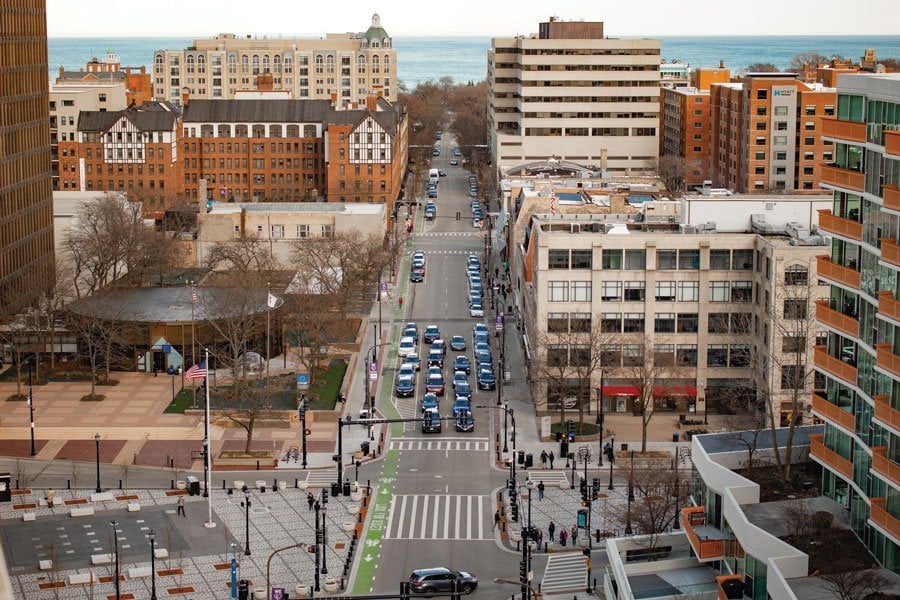Housing and Community Development Committee discusses contract renewals, affordable housing
Daily file photo by Evan Robinson-Johnson
An aerial view of Evanston. The Housing and Community Development Committee aims to benefit low- and moderate-income households by making housing affordable.
January 19, 2022
Evanston’s Housing and Community Development Committee approved recommendations of renewals for two city housing-related contracts on Tuesday, which will be sent to City Council.
The city split the Housing and Community Development Act Committee into the HCDC and the Social Services Committee in September. The HCDC is responsible for guiding Evanston’s housing-related funding and local resources and aims to benefit low- and moderate-income households by increasing funding for affordable housing projects.
The first contract approved for recommendation directs a maximum of $61,800 in funding to the Metropolitan Tenants Organization and Lawyers’ Committee for Better Housing, two Chicago-based tenants’ rights advocacy organizations. Under the proposed agreement, the MTO and LCBH would continue to provide services like a free hotline for landlord-tenant inquiries and information sessions for landlords and property owners to Evanston residents throughout 2022.
“(They) really are a great service,” said Sarah Flax, the city’s housing and grants manager. “Especially through the pandemic, the community has really benefited from (their presence).”
Evanston residents can contact MTO for free assistance with landlord-tenant inquiries by calling 311 or directly at 773-292-4988.
The committee also approved a recommendation to renew funding for Evanston’s Inclusionary Housing Ordinance, a centralized affordable housing waitlist administered by the Community Partners for Affordable Housing. If approved by the council, the program will receive a total of $43,000 for 2022, an increase from the previous $40,000 it received for 20 months of operation during 2020 and 2021.
The meeting agenda cited the actual operational cost for the 2020-21 contract period, which exceeded the allocated funds, as the primary reason for the increase. IHO conducts outreach to Evanston residents in need of affordable housing and screens applicants for its affordable housing waitlist.
The combined maximum of $104,800 in funding for the two contracts will come from the city’s Affordable Housing Fund, which sits at about $2.6 million.
Before the committee’s unanimous decision to approve these recommendations, some members shared their concerns about the pandemic’s impact on affordable housing. Ana Elizarraga, the committee’s newest member, said inquiries related to leases and evictions accounted for a significant portion of the total inquiries received by MTO and LCBH.
“Reasons why residents are sending inquiries are definitely related to the pandemic,” Elizarraga said. “The MTO and LCBH received the most inquiries about leases, followed by maintenance and evictions.”
MTO’s hotline received 99 lease-related inquiries and 68 eviction-related inquiries last year, accounting for 24.09% and 16.55% respectively of the total number received.
Committee member Hugo Rodriguez said the pandemic has exacerbated the power imbalance between tenants and landlords.
“We need to move the balance, the pendulum, back towards the tenants,” Rodriguez said. “It is really burdensome for the tenants to find an apartment that is suitable for them.”
Email: [email protected]
Twitter: @fumaueda0103
Related Stories:
—New Housing and Community Development Committee talks funding and upcoming goals
—“Moving forward with tangible repair”: First recipients selected for Evanston reparations program
—New Illinois bill increases number of low-income families eligible for housing assistance


